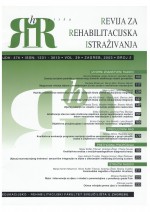Kvalitativna evaluacija programa razvijanja vještina samozastupanja u grupi odraslih osoba s umjerenom i težom mentalnom retardacijom
Qualitative Evaluation Program of the Self-Advocacy Skills Development among with Moderately and Severely Mentally Retarded Adults
Author(s): Marija Alfirev, Radojka JurinSubject(s): Education, Inclusive Education / Inclusion
Published by: Sveučilište u Zagrebu, Edukacijsko-rehabilitacijski fakultet
Keywords: self-advocacy; adults with mental retardation; leaders; staff; qualitative analysis;
Summary/Abstract: Self-advocacy is speaking or acting for oneself, In the case of a mentally retarded person, self-advocacy is any activity that includes action of self-determination. Implementing choices, making decisions, resolving problems and assertive communication are the skills that represent self-advocacy, and which mentally retarded persons do not have. The current system that emphasizes their protection by parents, employees in the segregated institutional living, does not enable the development of skills other people develop from childhood. The self-advocacy skill development program was designed for this reason, and it is based on the research "Self-advocacy and social competence of the person with moderate and severe mental retardation" (Alfirev, 2001). This research was implemented during six months within the group for self-advocacy. The group consisted of twelve adults that lived and worked in the Brach Olive - Centre for education and rehabilitation - Sibenik. The goal of this work was to determine the level of satisfaction of group members for self-advocacy, project head, assistant head and other staff, with the self-advocacy skill development program provided and initiating the participant's active involvement in future self-advocacy programs. Data were gathered using: Questionnaire for evaluating participant satisfaction (Ajduković, 1997; prepared by Alfirev, 2002), Project head evaluation of participant participation (Ajdukovit, 1997), Evaluation of project head's satisfaction (Ajduković, 1997), and semi-structured interviews with group members, aimed towards completing the program, applying acquired skills in every day life and cooperating with the staff and semi-structured interviews with Branch employees aimed towards observing changes and cooperating with the group members. The data obtained was qualitatively analyzed, and results indicate group work members are highly satisfied with joint meetings, cooperation with the other members of the group and project staff and in this context, satisfied with the project head and project assistant and relations within the group. Results relating to employee satisfaction indicate their divided attitudes towards self-advocacy of mentally retarded persons, which reflects their insufficient education about self-advocacy.
Journal: Hrvatska revija za rehabilitacijska istrazivanja
- Issue Year: 38/2003
- Issue No: 2
- Page Range: 179-188
- Page Count: 10
- Language: Croatian

